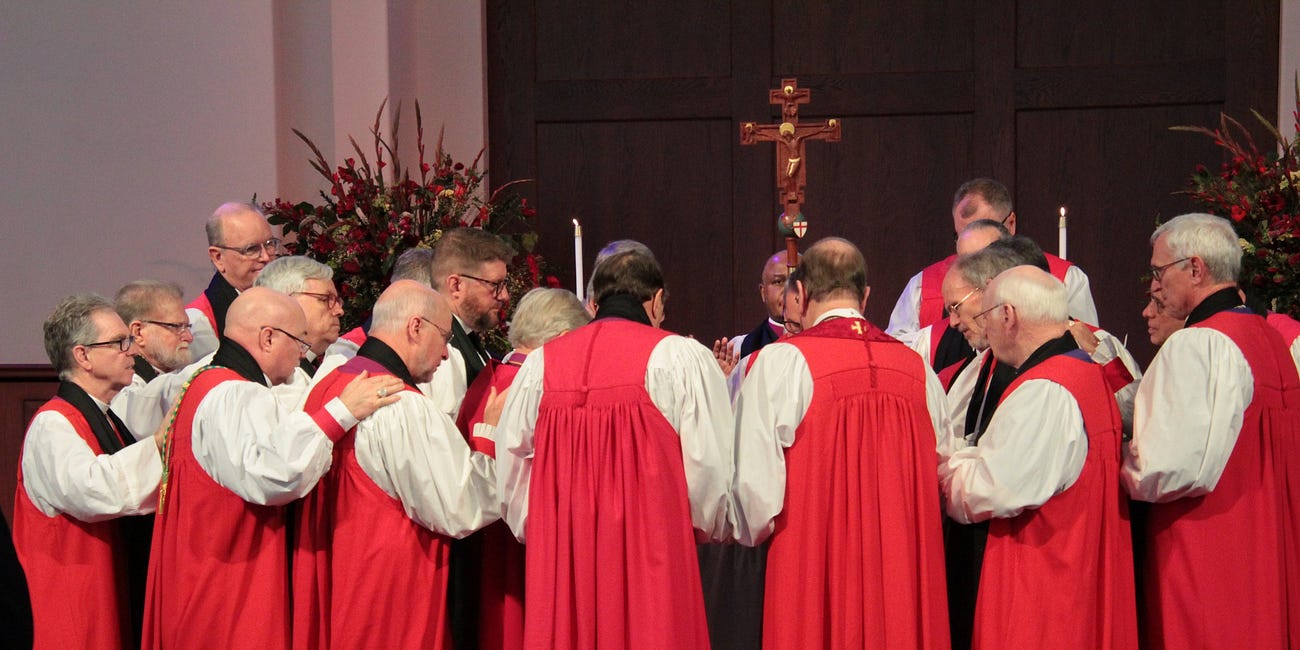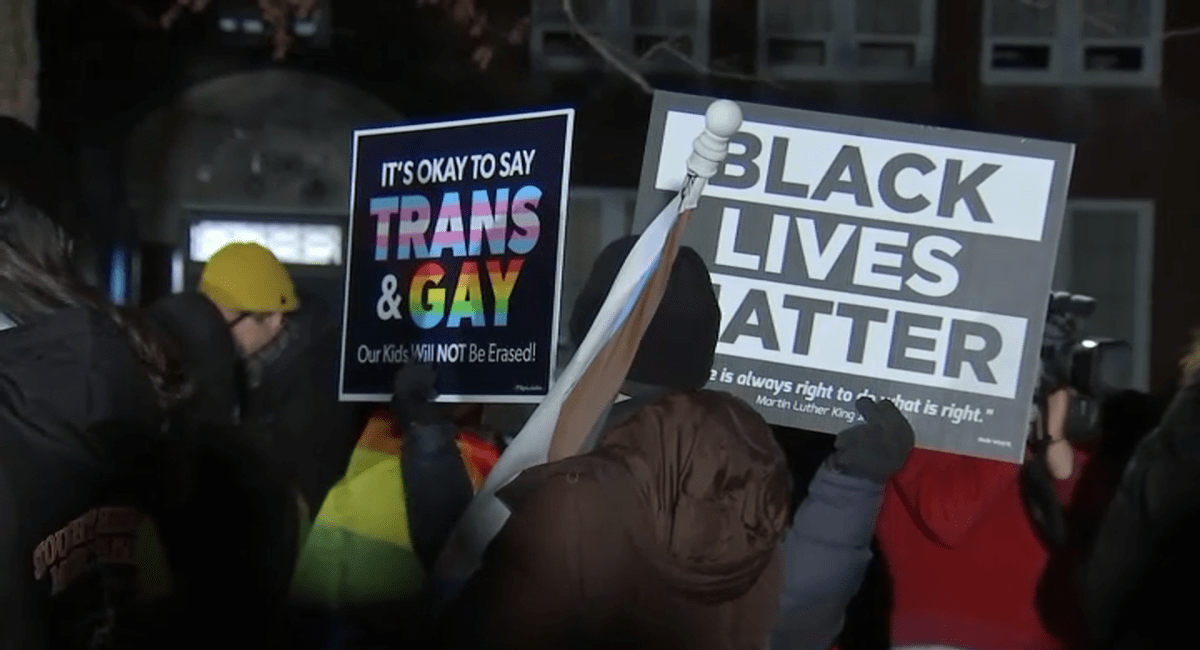Two-Tier Governance and Distrust in ACNA
One reason the Derek Jones case is creating so much heat.
If anyone is expecting me to take sides in the Bishop Derek Jones case in the Anglican Church in North America, let me leave you bereft of that hope. In watching this current mess, I once again see that the Bible is right, particularly Proverbs 18:17:
The first to plead his case seems right, Until another comes and examines him.
And in the Jones case, I could add “until yet another states their case and then another and . . . .” When this first became public, I thought the charges against Jones sounded lame. But then more details against Jones came out, albeit from anonymous sources, and I thought this really does not look good. And it still doesn’t. But men bravely posting under their names are well defending Jones. And I honestly do not know what to think.
So there is no way I am going to wade in and adjudicate this. Instead, I want to look at an overarching factor contributing to the heat and division in the Jones case, the Ruch case, and any number of matters in ACNA — the breakdown in trust.
Yes, I bought up ACNA’s trust problem this summer . . .
ACNA’s Trust Issues
I practically have to make myself post yet again on the current mess in the Anglican Church in North America. So if you have this vision of me rubbing my hands in sinister glee at the keyboard, you can banish that. But I have tried to keep up and be fair with this matter, so I will try to continue.
But I focused mainly on how Archbishop Steve Wood has lost trust. Now I want to look at how the breakdown in trust began long before Wood became Archbishop.
No, I’m not going to write a series, or at least I don’t intend to. And a series would be necessary to go through all the ways ACNA has squandered trust. For me, it began when the ink was hardly dry on the documents instituting the beginning of ACNA, and there was already a bishop or two flying around the country and ordaining women. That after women’s ordination was the most difficult issue in forming ACNA.
But you don’t want to get me started on that. Instead I want to focus on one of the bishops who signed the inhibition of Derek Jones — the Bishop of the Diocese of Churches for the Sake of Others (No, that is not satire.) Todd Hunter, who is about to retire. He embodies all too well why there is so much distrust within ACNA.
At a time when several denominations, and not just ACNA, were being torn apart by wokeness, Todd Hunter explicitly endorsed Critical Theory to his clergy. But that wasn’t enough for Hunter, not even close. Both his diocese and his propaganda project, the Center for Formation, Justice, and Peace, endorsed Liberation Theology. You read that right. And Hunter has platformed quite a number of woke church apostates. Behind women’s ordination, which Hunter also champions, wokeness is what has most divided and undermined ACNA.
ACNA is Finding Out that Wokeness Leads to Alphabet Apostasy
Monday over at Stand Firm, I pointed out that the Anglican Church in North America’s recurring problems with clergy and parishes becoming affirming is very much related to ACNA being hospitable to varieties of wokeness. After summarizing the latest Pride blow up in the Diocese of Churches for the Sake of Others (C4SO) and praising bishops for acting qui…
And Hunter and his diocese has been a focus of it.
Hunter was brought into ACNA largely because of his reputation for church growth. It wasn’t because he was Anglican; he was a Vineyard leader shortly before. But his diocese’s church growth included planting supposedly Anglican churches in areas where there already were actual Anglican churches. Understand that Anglicans are not like Baptists or non-denoms who can plant a church on every street corner and do fine. (Yes, I exaggerate but not by much.) Most U. S. Anglican congregations struggle in their attendance. So planting a trendy faux Anglican church nearby is not helpful. But that’s not all with C4SO’s cancerous church growth. Several of C4SO’s church plants became affirming and assisted the church growth of the Episcopal Church once they departed ACNA for that apostate body.
I could go on. And I could take other bishops to task — you know I can. But it is fair to say that Todd Hunter has done far more damage to ACNA than Derek Jones ever did. Yet not only does Hunter remain a bishop in good standing, he has the gall to sign the inhibition of Derek Jones and sign the presentment of Stewart Ruch before that.
So even if the actions taken against Jones are correct, they have the odor of woke two-tier governance. Push Liberation Theology and divide ACNA with open wokeness, no problem! Lean too hard on your clergy and oppose wokeness, inhibit with more discipline to come!
Yes, it is not unlike the Church of Rome, in which the likes of Cupich and McElroy are made cardinals, and an unusually faithful bishop like Joseph Strickland is stripped of his diocese. So no siren calls of “Come to Rome” from you papists!
Such two-tierism invites distrust, and distrust is exactly what ACNA is now receiving from many and not only surrounding the Derek Jones case. And it will continue in just about every issue of contention.
It is not too late to restore trust in ACNA. But, as I wrote this summer, that would require “a change in direction and fast.” And I’ve yet to see it. I’ve yet to see anything like that.
Pray for ACNA.



The church-as-business model from Protestant church-like fellowships has dominated evangelical groups. ‘Management’ becomes corporate communications and public relations. No one trusts this approach. ACNA needs to go back to older models of church planting that emphasizes preparation for baptism, baptism, and confirmation. Transparency not slickness is the key to the future of the ACNA. Some apostolic succession church’s need to sustain catholicity in light of the progressive destructive impulses in North American society.
My formation as a Christian was through evangelical youth missions while living overseas and in the Episcopal church for my early childhood and young adulthood. I consider myself an Anglican and pray twice daily from the BCP, but there are no Anglican churches in my town, and I no longer feel comfortable in the Episcopal church.
As a result, I find myself in a charismatic nondenominational church with strong Christian community and Biblical teaching.
It is distressing to see this happening in the ACNA, and I wonder if the future of Anglicanism just isn’t in N America or England. I wonder how many people find themselves in my position with love for orthodox Anglicanism but no way to express it— a free range Anglicanism.